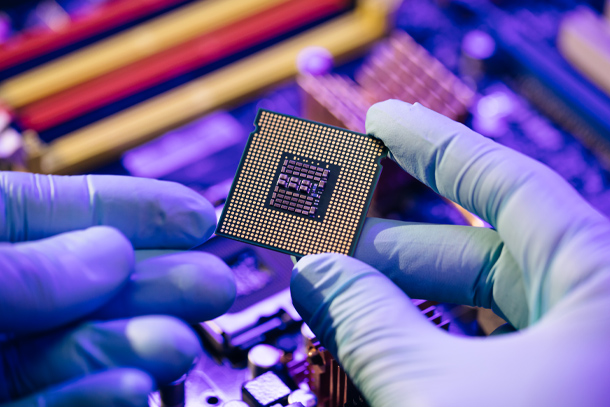
Osama O. Awadelkarim, professor of engineering science and mechanics and the UNESCO Chair on Building Innovation and Manufacturing Capacities through Advanced Technology Education at Penn State, testified before the U.S. Congressional Subcommittee on Research and Technology to discuss how to strengthen the American semiconductor manufacturing workforce. Credit: Mykola Pokhodzhay
Engineer testifies on microelectronics before congressional subcommittee
3/30/2022
By Ashley J. WennersHerron
UNIVERSITY PARK, Pa. — Osama O. Awadelkarim, professor of engineering science and mechanics and the UNESCO Chair on Building Innovation and Manufacturing Capacities through Advanced Technology Education at Penn State, testified before the U.S. Congressional Subcommittee on Research and Technology on Feb. 15. The hearing was titled “Strengthening the U.S. Microelectronics Workforce.”
The hearing was called to explore the barriers, and the potential solutions, to building awareness of and preparing workers for semiconductor manufacturing jobs in the U.S. The Creating Helpful Incentives to Produce Semiconductors (CHIPS) for America Act, enacted in 2020, authorizes the development of programs to grow the country’s capacity for manufacturing microelectronics — production that is currently outsourced internationally. Funding for the programs was included in another act that passed the House in February and is pending voting in the Senate.
“With the advent of the Internet of Things and artificial intelligence, semiconductors in the form of integrated circuits (ICs), or ‘chips,’ have become an integral part of our technology driven world today,” Awadelkarim said in his testimony. “Almost all products that we use, from a microwave oven to mobile phones to advanced computers, utilize ICs in one way or another. Hence, the need for chips has risen sharply while the chip supply worldwide has fallen significantly short of the demand.”
According to Awadelkarim, the U.S. supplied about 40% of the world’s chips in the 1990s. Since then, U.S. chip manufacturing has dropped to about 10% of the world supply. The issue, he said, is that, while some jobs exist and more are coming with the new legislature, there are too few programs to adequately train a workforce that could shift those numbers back.
“For the U.S. to restore world leadership in chipmaking, it is imperative to increase domestic advanced semiconductor manufacturing capacity and capability,” said Awadelkarim, who also directs the Penn State Center for Nanotechnology Education and Utilization (CNEU), which houses the Nanotechnology Applications and Career Knowledge Center (NACK). He explained that this increase depends on the critical workforce sector comprising technicians.
Penn State established the CNEU in 1998 specifically to address the need for skilled workers in the semiconductor industry across Pennsylvania.
“To meet the industry call, CNEU, Pennsylvania community colleges, other two-year degree-granting institutions in Pennsylvania and industry worked together to create a two-year degree program teaching micro- and nano-scale fabrication and characterization with an emphasis in semiconductor processing and applications,” Awadelkarim said.
The collaboration evolved into the Pennsylvania Nanofabrication Manufacturing Technology Partnership, in which students take foundational courses at their home colleges and then complete immersion training in CNEU’s teaching classroom at Penn State’s University Park campus. Many of the two-year institutions lack the facilities to adequately prepare students with the hands-on skills, Awadelkarim said, so the resource-sharing approach enables more rapid training for a more expansive cohort than before.
The National Science Foundation replicated the Pennsylvania model nationwide through NACK, which aims to further grow nano-education partnerships nationwide by enhancing dissemination of educational resources and providing key infrastructure, according to Awadelkarim. NACK has since established the Remotely Accessible Instruments for Nanotechnology (RAIN) Network to provide web access to tools and technology to workforce training institutions.
“This approach is a proven, working model for accomplishing the needed nanotechnology workforce training crucial to U. S. competitiveness,” Awadelkarim said. “The pioneering work by CNEU has established Pennsylvania as a global leader in micro- and nanofabrication education and workforce development.”
Awadelkarim concluded with a call-to-action for the federal government to fund more programs that enable university-community college partnerships; increase student flexibility to use grants and loans; and identify ways to incentivize and reward industry participation in training programs.
The subcommittee, housed under the Committee on Science, Space, and Technology in the U.S. House of Representatives, is chaired by Reps. Haley Stevens of Michigan and Eddie Bernice Johnson of Texas. In addition to Awadelkarim, Shari Liss, executive director of the SEMI Foundation, and Tsu-Jae King Liu, Dean and Roy W. Carlson Professor of Engineering at the University of California, Berkeley, also testified.



